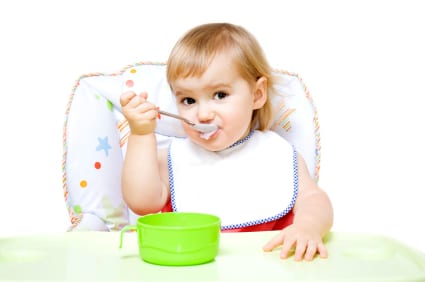While the food you feed you toddler is primarily intended to give him the get-up-and-go he requires to carry out his daily activities, the meals you select may also play a large part in his development. During this stage of growth, your child’s brain is maturing at a rapid rate. Because so much brain construction is underway, it is vital that you feed him a diet conducive to brain development. When picking his meals, consider the components required for proper brain development.
The Diet-Brain Connection
Your toddler’s brain requires set nutrients to develop properly, and it is through food consumption that he acquires these nutrients. If any of the elements needed for proper brain development are lacking in your toddler’s diet, his brain may struggle to develop properly in the absence of these elements.
Feeding His Brain Fat
Many moms try to keep their tots from consuming fat as much as possible. While this is generally a good rule of thumb, it is also important to remember that the brain is composed of 60 percent fat. For this reason, you must not simply eliminate fat from your toddler’s diet, but instead make sure that he is eating the right fats. Select foods rich in omega-3 fats, EPA and DHA as these fats are proven to lead to better brain development. Foods such as fish and green vegetables contain lots of these good fats and make a great addition to a toddler’s diet.
Impact of Iron
Iron is vital not only for brain development, but also for keeping your on-the-go toddler energized enough to explore the world around him. As ToddlersToday reports, iron helps the blood carry oxygen. If this element is lacking, children’s bodies cannot function as efficiently. To ensure that your toddler gets enough iron, feed him a diet rich in lean proteins and dark green vegetables, such as broccoli, as these foods are iron powerhouses.
Calming Carbs
Carbohydrates are the fuel that keeps the body pumping. These complex dietary elements are difficult for a toddler’s body to digest and, as a result, stick with him longer than other food types. Along with providing fuel, this dietary element also has a calming effect and reduces the release of stress hormones, reports AskDrSears, likely leading to a calmer and more focused toddler. To ensure that your child gets enough of this element in his diet, trade his white bread for a whole-wheat option and give him fruits, such as apples and pears, at snack time.
Give in to Grazing
While it may seem logical to limit or completely forbid between-meal snacking as a means by which to avoid over consumption, this practice isn’t necessarily best when it comes to feeding a toddler’s brain, reports AskDrSears. Toddlers’ bodies work best when they graze throughout the day instead of downing large meals periodically. By allowing your child to graze on healthy options, you can ensure that his body always has the fuel it requires not only to keep your toddler moving, but also to complete the complex brain-development tasks that occur during this developmental stage.





